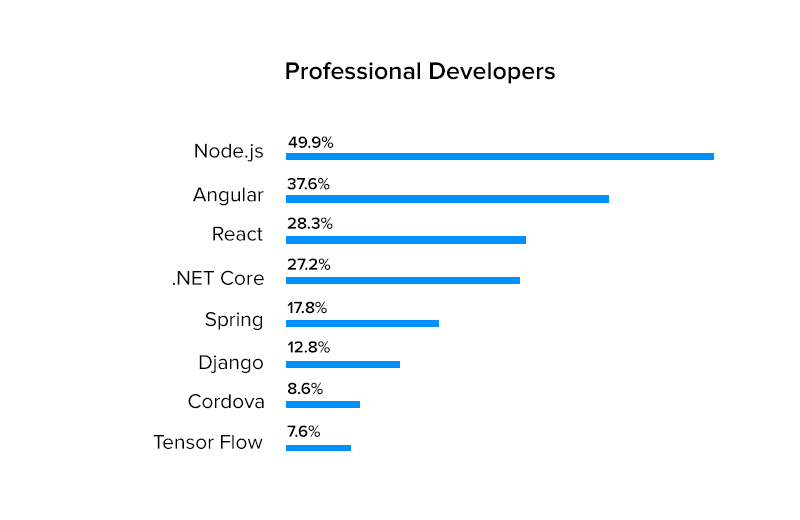


Node.js is the go-to choice for developers seeking a high-performance, scalable, and unified development experience. Built on Chrome’s V8 JavaScript engine, Node.js ushers JavaScript into the realm of server-side programming, breaking the barriers between front-end and back-end development.
How Node.js works lies in its non-blocking, event-driven architecture. Unlike traditional server-side languages that rely on multi-threading, Node.js utilizes a single-threaded event loop to manage requests efficiently. This design choice enables Node.js to handle numerous simultaneous connections without bogging down the system or incurring excessive resource overhead.
What benefits does Node.js actually offer you as a startup? In this section, we list six objective reasons why you should choose Node.js for your web or app development projects.
In a StackOverflow survey, Node.js was voted rank #1 for two years running in the miscellaneous technology category. This goes on to show how well-knit and widespread the developer community is on this tool. Constant upgrades keep people coming back for more, and access ready-to-use plugins and code-bytes accessible on GitHub.

In recent years, Node.js has gained significant popularity among developers, with 47.12% of them choosing this open-source server environment as their leading web framework. Not surprisingly, many startups and corporate companies are leaning towards this.
If you’re evaluating the pros and cons of Node.js for your next project, it’s, of course, crucial to understand just how powerful this JavaScript runtime can be. Let us share our rationale for why Node.js will be just as popular in the startup community in 2023.
One of the most prominent Node.js advantages is the use of a single programming language (JavaScript) for front-end and back-end development. As a result, startups won’t need to engage separate developers. Also, Node.js require fewer files and less code. It helps save a lot of time, money, and energy in startup product development—a significant benefit for startups with limited funds.
Time is priceless for startups. They have to work tirelessly for the first few months to iterate, test, deploy, and deliver as quickly as possible while still on a tight budget and a lean team. Node.js is particularly helpful in making the time-to-market cycle shorter.
Scalability is built into the core of Node.js. It is one of Node’s basic benefits for startups planning to grow over time. App-based startups choose to develop lightweight and fast systems with good real-time responses that can be scaled up later and add more modules to the existing ones easily. You never know how high you will go.
What Node is good for is its compatibility with microservices architecture, which is beneficial for projects that will scale and grow in the future. Also, it is possible to create a separate microservice for any functionality and then scale it separately from all other parts.
The next Node.js advantage is its effectiveness in quickly turning a concept into a prototype. Regardless of the project you are working on, it won’t take long. With Node.js, developers can rapidly develop an MVP (Minimum Viable Product) for user feedback to improve the next iteration and assess product viability. With an MVP, startups can find the right audience, use insights from experience, and save time.
Beyond back-end development, Node.js thrives in the front-end realm, empowering developers to build full-stack applications using frameworks like Express.js and Socket.IO. This unified approach streamlines development and diminishes the necessity for separate front-end and back-end teams, ultimately saving both time and resources.
Node.js is an open-source runtime environment built on the Chrome V8 JavaScript engine. It allows developers to run JavaScript code on the server-side, enabling them to build scalable and efficient web applications.
Node.js is a JavaScript runtime built on Chrome's V8 JavaScript engine that allows JavaScript to be used for server-side programming, bridging the gap between front-end and back-end development.
Node.js enables cost-effectiveness by using a single programming language (JavaScript) for both front-end and back-end development, eliminating the need for separate developers. It also requires fewer files and less code, saving time, money, and energy in startup product development.
Node.js is effective in quickly turning a concept into a prototype, allowing startups to rapidly develop a Minimum Viable Product (MVP) for user feedback. This helps improve subsequent iterations, assess product viability, and save time in the development process.
Node.js has gained significant popularity among developers, with 47.12% of them choosing it as their leading web framework. Its efficiency, scalability, and unified development experience make it attractive to developers worldwide.